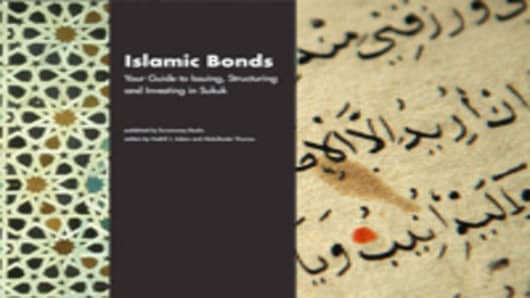Investors in Western securities have been given plenty to fret about recently as markets have seized up, money flows have frozen, and confidence has evaporated. But at least they haven't had to tangle with God as well.
Not so in Islam, where the world's fastest-growing debt market has hit the skids in part because leading Islamic scholars began to question whether some popular Islamic bonds, or sukuks, followed Islamic law.
The fact that such questions exist point to a peculiar risk in Islamic markets that—because leverage is generally eschewed and securities are closely tied to assets—have been viewed as more resilient than their Western counterparts.
The questions also come at a time when that resilience is showing its limits; the Middle East is now grappling with the contagious global credit crunch and worries over its own overheated asset market. And the debate among Islamic scholars is sure to complicate those woes.
"The irony is that current market conditions are the result of deficiencies with [the] backbone of the conventional finance industry," says Rahail Ali, head of Islamic Finance at the Dubai office of Lovells, and English law firm.
Ali added that the debate among Shariah scholars has gained prominence because the sukuk market is now "open to a much wider investor base, some of which isn't familiar with the fact that differences of opinion among the Shariah scholars are very much to be expected."
Those investors got their first taste of "religious interpretation risk" last November when Sheik Muhammad Taqi Usmani said he believed that as much as 85 percent of Islamic bonds already in the market had a critical religious flaw baked into them: They guaranteed a buyer that principal would be paid back, even in the case of default.
Conventional bonds routinely carry such provisions but they are problematic for Muslims who are, among other things, barred from accepting interest, or engaging in any business where profit and risk are not equally shared.
To work around some of the simplest issues, Islamic bonds are supposed to derive their payment stream from the revenue thrown off by a real asset or some similar structure, while any repurchase is seen as just a return on a lease, and should be done at market rates.
But in an attempt to securitize a wider array of assets, or to make more appealing structures, many Islamic bonds have veered too close to a Western interpretation of what a bond should be. Or, as Usmani wrote, Islamic financial institutions, in an attempt to compete in "the conventional, interest-based marketplace," have churned out products that give lip-service to Islam while using "ploys that sound minds reject and bring laughter to enemies."
Such statements by Usmani, who is the powerful chairman of the board of Islamic scholars at the Bahrain-based Accounting and Auditing Organization for Islamic Financial Institutions, sent a chill through the sukuk market.
A clarification in February by the entire A.A.O.I.F.I. board outlining more clearly how sukuks could stay in compliance didn't provide much reassurance.
The effect on financing has been measurable. So far this year, only about $14 billion in Islamic bonds have been issued, compared with around $23 billion during the same time frame last year, according to Standard & Poor's. That is a decline of almost 40 percent.
- Five Stocks for Self Defense
- The Bailout and Your Bottom Line
- Cramer: Sell, Sell Sell This Market
- Pros: More Gloom and a Silver Lining
- Five-Star Manager's Strategy: Go Cycical
Noting the "confusion" over what scholars will deem to be acceptable Islamic debt structures, Jaime Sanz of Fitch's emerging markets structured-finance team wrote in a recent research note that "a liquid, transparent, and efficient" Islamic debt market "is of paramount importance" as countries including Saudi Arabia and the United Arab Emirates face the need for "substantial" infrastructure investments.
While much of the Middle East's development still relies on conventional finance, the $70 billion Islamic bond market has grown rapidly thanks to the huge influx of petrodollars and the greater interest in Shariah-compliant investing among Muslims.
"Just as there are more women wearing veils, there are more people interested in Islamic products," says Professor Ibrahim Warde, of the Fletcher School of Law and Diplomacy at Tufts University. The sukuk market, he adds, is just part of a $900 billion Islamic financial sector that grew about 37 percent in 2007.
Those assets have attracted Western bankers looking for a foothold in the Middle East, and Western institutions looking for diversification with attractive yields. Just "10 or 15 years ago, many Western institutions would not have been interested in Islamic finance because it looked too complicated," Warde says. But now, Western banks like J.P. Morgan , Citigroup , and Morgan Stanley are among the leading underwriters in the Islamic bond market.
That market has become the backbone of the Islamic insurance industry, a catalyst for the development of the region's capital markets, and has funded the development of everything from Bahrain's financial center and Dubai's Palm development to Emirates Airlines' expansion and a Kuwaiti-led consortium's leveraged buyout of British sports-car maker Aston Martin.
A $100 billion market by 2009
Sukuks have also begun to be floated in Western markets and are backing Western assets. The German state of Saxony-Anhalt and the World Bank have both issued sukuks, while a small Texas oil and gas exploration firm called East Cameron Partners issued an Islamic bond backed by some of its offshore Louisiana gas reserves.
Standard & Poor's estimates that the sukuk market will exceed $100 billion by 2009, even with the latest hiccup. But the Islamic bonds that will be floated are unlikely to push the envelope in the ways others did before, and the innovation that helped sukuks gain acceptance in an ever-growing universe of deals could slow.
Dr. Mohamed Damak, a ratings specialist at Standard & Poor's, notes that he has "clearly noticed a shift in the structures of sukuks issued in 2008 toward Ijara (where financing is accomplished through a form of sale-lease back of real assets) away from Musharakah (a more controversial form of profit-sharing questioned by Islamic scholars).
Even without the religious controversy, questions remain as to whether sukuks might ever grow beyond being a niche product, since Islamic law prohibits them from being tranched (sliced up into different yields) or effectively hedged.
Professor Samuel Hayes of Harvard Business School notes that the prohibition on hedging means that any financial arrangement that could be affected by changes in exchange rates or in the rate of inflation leaves the investor "vulnerable to a very substantial risk."
They also have yet to be tested in a default. Warde says this is among the chief concerns for the market going forward. Although sukuk issuers have tried to devise asset liquidation mechanisms that dovetail with those found in conventional bonds, none of these have been tested in court.
"The main fear that investors have is what will happen in practice if some sukuk goes bad," he says. While most Islamic contracts now prescribe English law to be governing, Warde says that "in the case of failure of sukuk, the process of adjudication will be a complex and long-drawn affair, whereby judges will want to know what sukuk really are, and as part of that process, Shariah scholars will no doubt have some input."
With easy credit and oil powering the Gulf real estate markets to dizzying heights, such defaults might come sooner than anyone thinks, making the Shariah scholars among the hottest commodities around.



